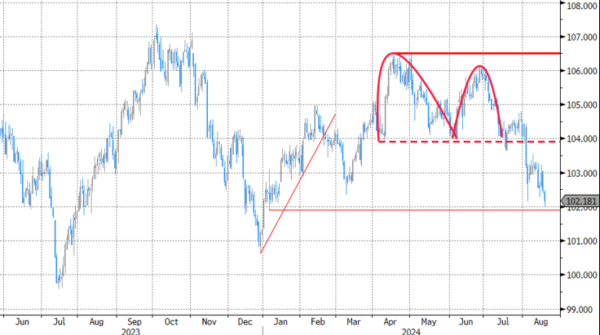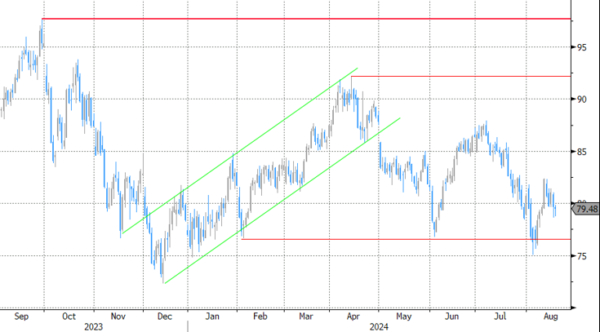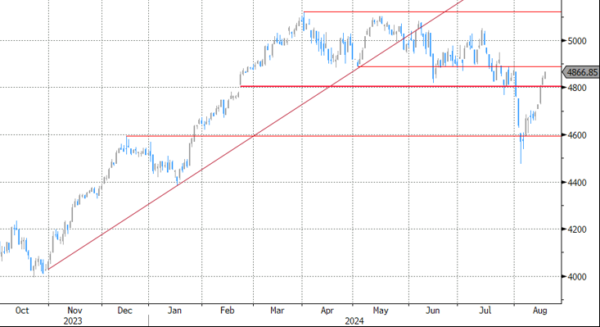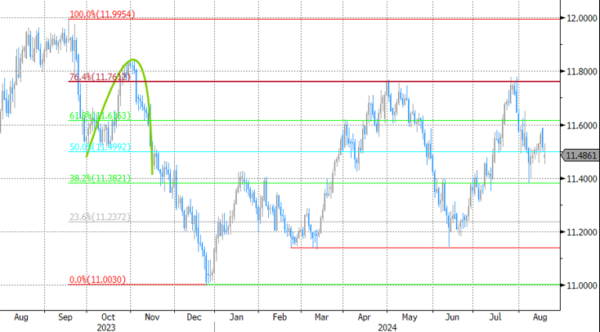Markets
Markets took a slow start to the new trading week which looks more enticing later on. In the absence of high profile headlines today, softer yields and a weaker dollar initially proved the to be the path of least resistance, even as the momentum of this trade eased as US traders joined. German/EMU yields reversed small declines to currently trade up to 1.5 bps higher. US yields show a similar picture. Still, any sustained rebound in yields looks difficult for now. US inflation, while still well above the 2% target, has softened enough for the Fed to give more weight to growing signs of a cooling of activity and, in particular, a slowdown in job creation. Last week’s US data (retail sales) suggest that the US economy is heading for a soft landing, rather than an outright recession. Still markets see room for the Fed to ‘substantially’ scale back policy tightening in order to prevent an unnecessary slowdown in activity/rise in unemployment. This week, the (US) PMI’s, comments at the Fed Jackson Hole symposium, the minutes of the July Fed meeting and the annual revision of the BLS’ US payrolls data might help markets to make up their mind on the pace of Fed easing. The debate remains open (and that probably remains the case after Jackson Hole), but markets continue to err on the side of the Fed being behind the curve. Fear for a sharp US downturn triggered a wild risk-off correction early August, but stocks in the meantime rebounded on the hope of easier (global) financial conditions. However, with especially US markets having reversed course, the risk rebound is shifting into a lower gear. Europe now outperforms the US (Eurostoxx 50 + 0.5%, S&P 500 +0.1%). Oil (Brent $79.2/b) still struggles to hold the $80/b reference despite ongoing geopolitical tensions in the Middle East region as uncertainty on global demand lingers.
Anticipation of easier financial conditions keep the dollar in the defensive. USD/JPY this morning tested the 145.20 area (compared to a 147.63 close on Friday) but the USD selling gradually eased intraday (146.15 currently). EUR/USD (1.1035) regained the 1.10 barrier. The EMU eco picture remains uninspiring, but high wage growth (Q2 ECB negotiated wages to be published on Thursday) might force the ECB to take a guarded approach on further easing. The December EUR/USD 1.1139 top is within reach with the 2023 top at 1.1276. Sterling initially tried to extend its post-CPI comeback from end last week, but EUR/GBP 0.85 support holds (currently 0.852).
News & Views
Bulgarian president Radev unexpectedly declined to approve a new interim cabinet, adding he will delay snap elections until after October 20. His decision deepens the political turmoil in the country, which will head to the ballot for the seventh time in less than four years. President Radev, whose powers have already been clipped by the government following several unilateral decisions to form governments over the past years, said that interior minister Stoyanov wouldn’t be able to guarantee fair elections if he continues in his role. The current political crisis delays Bulgarian efforts to join the euro. The middle of 2025 target date (already delay from 1/1/2025) is on a slippery slope. Apart from politics, the country has difficulties meeting the price stability criterion for joining EMU with average inflation rates well above the ECB’s June 2024 convergence report reference value (3.3%).
Rating agency Fitch this weekend confirmed the Czech Republic’s AA- rating with a stable outlook. It is underpinned by a record of credible macroeconomic and monetary policies, and a robust institutional framework. Fitch has revised down this year’s real GDP growth forecast to 0.9%, from 1.2% expected in February, given the weak start to the year and subdued external demand, but puts forward an average 2.4% growth rate in 2025-2026. Headline inflation has been moving close to the central bank’s target of 2% and is set to average 2.2% in 2024-2026, allowing the CNB to continue its easing cycle bringing the key rate at 3.75% by end-2024 (in line with our forecast) and 3.5% by end-2025. Fitch expects the budget deficit to narrow to 2.5% of GDP in 2024 and 2.2% in 2025 from 3.5% in 2023. The debt/GDP ratio is set to increase to 43.7% in 2025, from 42.4% in 2023 and to gradually decline to 42.9% in 2028 driven by the narrowing of primary budget deficits and recovering economic growth.
Graphs
DXY (trade-weighted USD index) testing 102 big figure as easing of global financial conditions continues to pressure the dollar
Brent oil struggles to hold the $80/b reference as uncertainty on global demand persists
Eurostoxx 50 reversing early month risk-off repositioning
EUR/SEK holding near 11.50 pivot as Riksbank is expected to further scale back policy restriction.




